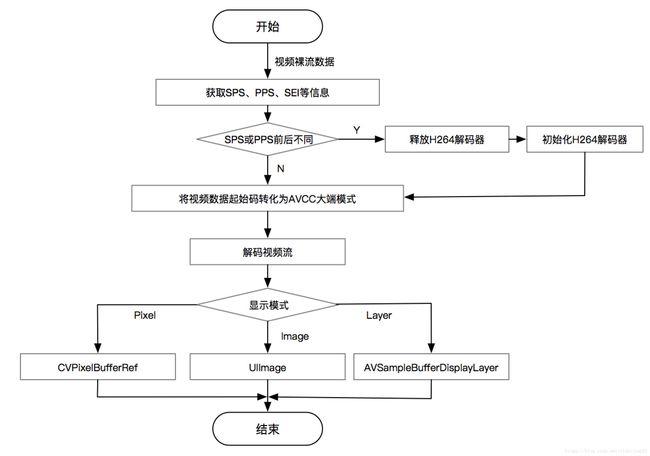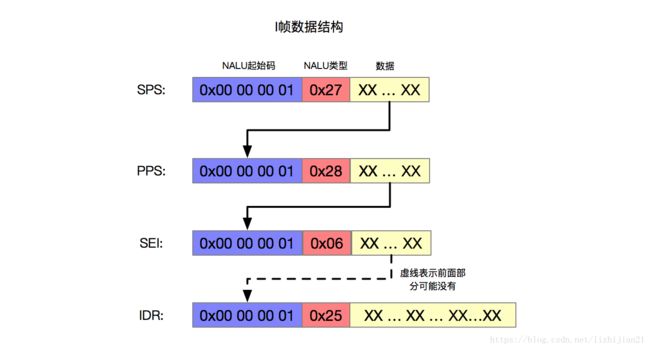注:最近研究h264硬解码,这篇文章在小端转大端上做的不错,亲测可行!感谢!
https://blog.csdn.net/lizhijian21/article/details/80829947
苹果在iOS 8.0系统之前若要做音视频开发需使用第三方软件进行编解码(FFmpeg软解码H264视频流可看到这里),学习成本较大,项目开发进度也可能超出预期。在iOS 8.0之后开放了视频编解码框架VideoToolbox,在此之后对于音视频开发变得相对简单。
一、硬解码名词(结构)解释
1、VTDecompressionSessionRef:解码器对象数据结构;
2、CMVideoFormatDescriptionRef:图形解码相关格式及描述;
3、CVPixelBufferRef:编码前和解码后的图像数据结构;
4、CMBlockBufferRef:存在解码前图像数据内存结构;
5、CMSampleBufferRef:存放解码前的视频图像的容器数据结构;
6、AVSampleBufferDisplayLayer:以CMSampleBufferRef进行解码并显示Layer图层;
7、SPS、PPS:h.264解码参数信息;IDR:h.264视频流I帧;
二、H264硬解码流程图
三:IDR(I帧)网络裸流数据结构
一般情况下网络视频裸流I帧中基本会包含SPS、PPS、SEI、IDR帧数据,如下图所示,但是部分只含有IDR帧数据,其他解码参数信息被单独已Slice获取。
四、硬解码相关接口
1、初始化H264硬解解码器
1)使用CMVideoFormatDescriptionCreateFromH264ParameterSets函数构建解码描述结构CMVideoFormatDescriptionRef:
const uint8_t *const parameterSetPointers[2] = {pSPS,pPPS};
const size_t parameterSetSizes[2] = {mSpsSize, mPpsSize};
OSStatus status = CMVideoFormatDescriptionCreateFromH264ParameterSets(kCFAllocatorDefault,
2, //参数个数,主要包含SPS、PPS
parameterSetPointers,
parameterSetSizes,
4, //NALU起始位个数
&mDecoderFormatDescription);
2)使用VTDecompressionSessionCreate函数构建解码器结构VTDecompressionSessionRef:
uint32_t pixelFormatType = kCVPixelFormatType_420YpCbCr8BiPlanarFullRange; //NV12
const void *keys[] = { kCVPixelBufferPixelFormatTypeKey };
const void *values[] = { CFNumberCreate(NULL, kCFNumberSInt32Type, &pixelFormatType) }; //32位
CFDictionaryRef attrs = CFDictionaryCreate(NULL, keys, values, 1, NULL, NULL);
VTDecompressionOutputCallbackRecord callBackRecord;
callBackRecord.decompressionOutputCallback = didDecompress;
callBackRecord.decompressionOutputRefCon = NULL;
status = VTDecompressionSessionCreate(kCFAllocatorDefault,
mDecoderFormatDescription,
NULL, attrs,
&callBackRecord,
&mDeocderSession);
CFRelease(attrs);
2、H264硬件解码
1)将视频裸流数据构建成CMBlockBufferRef,主要目的是进一步转换为CMSampleBufferRef:
CMBlockBufferRef blockBuffer = NULL;
OSStatus status = CMBlockBufferCreateWithMemoryBlock(kCFAllocatorDefault, (void *)videoBuffer, videoBufferSize, kCFAllocatorNull, NULL, 0, videoBufferSize, 0, &blockBuffer);
CMSampleBufferRef sampleBuffer = NULL;
const size_t sampleSizeArray[] = { videoBufferSize };
OSStatus status = CMSampleBufferCreateReady(kCFAllocatorDefault, blockBuffer, mDecoderFormatDescription , 1, 0, NULL, 1, sampleSizeArray, &sampleBuffer);
2)将CMSampleBufferRef结构送入VTDecompressionSessionDecodeFrame函数进行解码处理:
VTDecodeFrameFlags flags = 0;
VTDecodeInfoFlags flagOut = 0;
CVPixelBufferRef outputPixelBuffer = NULL;
OSStatus decodeStatus = VTDecompressionSessionDecodeFrame(mDeocderSession, sampleBuffer, flags, &outputPixelBuffer, &flagOut);
3)若使用AVSampleBufferDisplayLayer图层进行直接显示,可忽略上一步的还行,直接将CMSampleBufferRef送入AVSampleBufferDisplayLayer进行显示:
CFArrayRef attachments = CMSampleBufferGetSampleAttachmentsArray(sampleBuffer, YES);
CFMutableDictionaryRef dict = (CFMutableDictionaryRef)CFArrayGetValueAtIndex(attachments, 0);
CFDictionarySetValue(dict, kCMSampleAttachmentKey_DisplayImmediately, kCFBooleanTrue);
if ([self.displayLayer isReadyForMoreMediaData]) {
@weakify(self);
dispatch_sync(dispatch_get_main_queue(),^{
@strongify(self);
[self.displayLayer enqueueSampleBuffer:sampleBuffer];
});
}
3、解码之后的数据显示
在本文中支持3种显示方式:UIImage、CVPixelBufferRef、AVSampleBufferDisplayLayer,因在项目中需要UIImage,所以被默认转化模式。
CVPixelBufferRef:即不进行UIImage转换而直接输出的方式;
AVSampleBufferDisplayLayer:不进行代码逻辑解码,被Layer层自行解码和显示;
UIImage:通过CVPixelBufferRef进一步转化所得(提供了2种转化方法,可在后面代码中查看):
CIImage *ciImage = [CIImage imageWithCVPixelBuffer:pixelBuffer];
CIContext *temporaryContext = [CIContext contextWithOptions:nil];
CGImageRef videoImage = [temporaryContext createCGImage:ciImage fromRect:CGRectMake(0, 0, CVPixelBufferGetWidth(pixelBuffer), CVPixelBufferGetHeight(pixelBuffer))];
image = [[UIImage alloc] initWithCGImage:videoImage];
CGImageRelease(videoImage);
五、完整H264解码代码
本人原则上主张自主编写相关代码并学习相应的知识,在此贴出iOS对H264视频裸流硬解码的完整代码,各位可进行参考或学习,若存在问题或者疑问欢迎留言。代码中关于CLog接口为打印输出,可自行屏蔽。
//
// H264HwDecoder.h
// IOTCamera
//
// Created by lzj on 2017/2/18.
// Copyright (c) 2017 LZJ. All rights reserved.
//
#import
#import
#import
typedef enum : NSUInteger {
H264HWDataType_Image = 0,
H264HWDataType_Pixel,
H264HWDataType_Layer,
} H264HWDataType;
@interface H264HwDecoder : NSObject
@property (nonatomic,assign) H264HWDataType showType; //显示类型
@property (nonatomic,strong) UIImage *image; //解码成RGB数据时的IMG
@property (nonatomic,assign) CVPixelBufferRef pixelBuffer; //解码成YUV数据时的解码BUF
@property (nonatomic,strong) AVSampleBufferDisplayLayer *displayLayer; //显示图层
@property (nonatomic,assign) BOOL isNeedPerfectImg; //是否读取完整UIImage图形(showType为0时才有效)
- (instancetype)init;
/**
H264视频流解码
@param videoData 视频帧数据
@param videoSize 视频帧大小
@return 视图的宽高(width, height),当为接收为AVSampleBufferDisplayLayer时返回接口是无效的
*/
- (CGSize)decodeH264VideoData:(uint8_t *)videoData videoSize:(NSInteger)videoSize;
/**
释放解码器
*/
- (void)releaseH264HwDecoder;
/**
视频截图
@return IMG
*/
- (UIImage *)snapshot;
@end
//
// H264HwDecoder.m
// IOTCamera
//
// Created by lzj on 2017/2/18.
// Copyright (c) 2017 LZJ. All rights reserved.
//
#import "H264HwDecoder.h"
#ifndef FreeCharP
#define FreeCharP(p) if (p) {free(p); p = NULL;}
#endif
typedef enum : NSUInteger {
HWVideoFrameType_UNKNOWN = 0,
HWVideoFrameType_I,
HWVideoFrameType_P,
HWVideoFrameType_B,
HWVideoFrameType_SPS,
HWVideoFrameType_PPS,
HWVideoFrameType_SEI,
} HWVideoFrameType;
@interface H264HwDecoder ()
{
VTDecompressionSessionRef mDeocderSession;
CMVideoFormatDescriptionRef mDecoderFormatDescription;
uint8_t *pSPS;
uint8_t *pPPS;
uint8_t *pSEI;
NSInteger mSpsSize;
NSInteger mPpsSize;
NSInteger mSeiSize;
NSInteger mINalCount; //I帧起始码个数
NSInteger mPBNalCount; //P、B帧起始码个数
NSInteger mINalIndex; //I帧起始码开始位
BOOL mIsNeedReinit; //需要重置解码器
}
@end
static void didDecompress(void *decompressionOutputRefCon, void *sourceFrameRefCon, OSStatus status, VTDecodeInfoFlags infoFlags, CVImageBufferRef pixelBuffer, CMTime presentationTimeStamp, CMTime presentationDuration )
{
CVPixelBufferRef *outputPixelBuffer = (CVPixelBufferRef *)sourceFrameRefCon;
*outputPixelBuffer = CVPixelBufferRetain(pixelBuffer);
}
@implementation H264HwDecoder
- (instancetype)init
{
if (self = [super init]) {
pSPS = pPPS = pSEI = NULL;
mSpsSize = mPpsSize = mSeiSize = 0;
mINalCount = mPBNalCount = mINalIndex = 0;
mIsNeedReinit = NO;
_showType = H264HWDataType_Image;
_isNeedPerfectImg = NO;
_pixelBuffer = NULL;
}
return self;
}
- (void)dealloc
{
[self releaseH264HwDecoder];
}
- (BOOL)initH264HwDecoder
{
if (mDeocderSession) {
return YES;
}
const uint8_t *const parameterSetPointers[2] = {pSPS,pPPS};
const size_t parameterSetSizes[2] = {mSpsSize, mPpsSize};
OSStatus status = CMVideoFormatDescriptionCreateFromH264ParameterSets(kCFAllocatorDefault, 2, parameterSetPointers, parameterSetSizes, 4, &mDecoderFormatDescription);
if (status == noErr) {
// kCVPixelFormatType_420YpCbCr8Planar is YUV420
// kCVPixelFormatType_420YpCbCr8BiPlanarFullRange is NV12
// kCVPixelFormatType_24RGB //使用24位bitsPerPixel
// kCVPixelFormatType_32BGRA //使用32位bitsPerPixel,kCGBitmapByteOrder32Little | kCGImageAlphaPremultipliedFirst
uint32_t pixelFormatType = kCVPixelFormatType_420YpCbCr8BiPlanarFullRange; //NV12
if (self.showType == H264HWDataType_Pixel) {
pixelFormatType = kCVPixelFormatType_420YpCbCr8Planar;
}
const void *keys[] = { kCVPixelBufferPixelFormatTypeKey };
const void *values[] = { CFNumberCreate(NULL, kCFNumberSInt32Type, &pixelFormatType) };
CFDictionaryRef attrs = CFDictionaryCreate(NULL, keys, values, 1, NULL, NULL);
VTDecompressionOutputCallbackRecord callBackRecord;
callBackRecord.decompressionOutputCallback = didDecompress;
callBackRecord.decompressionOutputRefCon = NULL;
status = VTDecompressionSessionCreate(kCFAllocatorDefault,
mDecoderFormatDescription,
NULL, attrs,
&callBackRecord,
&mDeocderSession);
CFRelease(attrs);
CLog(@"Init H264 hardware decoder success");
} else {
CLog([NSString stringWithFormat:@"Init H264 hardware decoder fail: %d", (int)status]);
return NO;
}
return YES;
}
- (void)removeH264HwDecoder
{
if(mDeocderSession) {
VTDecompressionSessionInvalidate(mDeocderSession);
CFRelease(mDeocderSession);
mDeocderSession = NULL;
}
if(mDecoderFormatDescription) {
CFRelease(mDecoderFormatDescription);
mDecoderFormatDescription = NULL;
}
}
- (void)releaseH264HwDecoder
{
[self removeH264HwDecoder];
[self releaseSliceInfo];
if (_pixelBuffer) {
CVPixelBufferRelease(_pixelBuffer);
_pixelBuffer = NULL;
}
}
- (void)releaseSliceInfo
{
FreeCharP(pSPS);
FreeCharP(pPPS);
FreeCharP(pSEI);
mSpsSize = 0;
mPpsSize = 0;
mSeiSize = 0;
}
//将视频数据封装成CMSampleBufferRef进行解码
- (CVPixelBufferRef)decode:(uint8_t *)videoBuffer videoSize:(NSInteger)videoBufferSize
{
CVPixelBufferRef outputPixelBuffer = NULL;
CMBlockBufferRef blockBuffer = NULL;
OSStatus status = CMBlockBufferCreateWithMemoryBlock(kCFAllocatorDefault, (void *)videoBuffer, videoBufferSize, kCFAllocatorNull, NULL, 0, videoBufferSize, 0, &blockBuffer);
if (status == kCMBlockBufferNoErr) {
CMSampleBufferRef sampleBuffer = NULL;
const size_t sampleSizeArray[] = { videoBufferSize };
status = CMSampleBufferCreateReady(kCFAllocatorDefault, blockBuffer, mDecoderFormatDescription , 1, 0, NULL, 1, sampleSizeArray, &sampleBuffer);
if (status == kCMBlockBufferNoErr && sampleBuffer) {
if (self.showType == H264HWDataType_Layer && _displayLayer) {
CFArrayRef attachments = CMSampleBufferGetSampleAttachmentsArray(sampleBuffer, YES);
CFMutableDictionaryRef dict = (CFMutableDictionaryRef)CFArrayGetValueAtIndex(attachments, 0);
CFDictionarySetValue(dict, kCMSampleAttachmentKey_DisplayImmediately, kCFBooleanTrue);
if ([self.displayLayer isReadyForMoreMediaData]) {
@weakify(self);
dispatch_sync(dispatch_get_main_queue(),^{
@strongify(self);
[self.displayLayer enqueueSampleBuffer:sampleBuffer];
});
}
CFRelease(sampleBuffer);
} else {
VTDecodeFrameFlags flags = 0;
VTDecodeInfoFlags flagOut = 0;
OSStatus decodeStatus = VTDecompressionSessionDecodeFrame(mDeocderSession, sampleBuffer, flags, &outputPixelBuffer, &flagOut);
CFRelease(sampleBuffer);
if (decodeStatus == kVTVideoDecoderMalfunctionErr) {
CLog(@"Decode failed status: kVTVideoDecoderMalfunctionErr");
CVPixelBufferRelease(outputPixelBuffer);
outputPixelBuffer = NULL;
} else if(decodeStatus == kVTInvalidSessionErr) {
CLog(@"Invalid session, reset decoder session");
[self removeH264HwDecoder];
} else if(decodeStatus == kVTVideoDecoderBadDataErr) {
CLog([NSString stringWithFormat:@"Decode failed status=%d(Bad data)", (int)decodeStatus]);
} else if(decodeStatus != noErr) {
CLog([NSString stringWithFormat:@"Decode failed status=%d", (int)decodeStatus]);
}
}
}
CFRelease(blockBuffer);
}
return outputPixelBuffer;
}
- (CGSize)decodeH264VideoData:(uint8_t *)videoData videoSize:(NSInteger)videoSize
{
CGSize imageSize = CGSizeMake(0, 0);
if (videoData && videoSize > 0) {
HWVideoFrameType frameFlag = [self analyticalData:videoData size:videoSize];
if (mIsNeedReinit) {
mIsNeedReinit = NO;
[self removeH264HwDecoder];
}
if (pSPS && pPPS && (frameFlag == HWVideoFrameType_I || frameFlag == HWVideoFrameType_P || frameFlag == HWVideoFrameType_B)) {
uint8_t *buffer = NULL;
if (frameFlag == HWVideoFrameType_I) {
int nalExtra = (mINalCount==3?1:0); //如果是3位的起始码,转为大端时需要增加1位
videoSize -= mINalIndex;
buffer = (uint8_t *)malloc(videoSize + nalExtra);
memcpy(buffer + nalExtra, videoData + mINalIndex, videoSize);
videoSize += nalExtra;
} else {
int nalExtra = (mPBNalCount==3?1:0);
buffer = (uint8_t *)malloc(videoSize + nalExtra);
memcpy(buffer + nalExtra, videoData, videoSize);
videoSize += nalExtra;
}
uint32_t nalSize = (uint32_t)(videoSize - 4);
uint32_t *pNalSize = (uint32_t *)buffer;
*pNalSize = CFSwapInt32HostToBig(nalSize);
CVPixelBufferRef pixelBuffer = NULL;
if ([self initH264HwDecoder]) {
pixelBuffer = [self decode:buffer videoSize:videoSize];
if(pixelBuffer) {
NSInteger width = CVPixelBufferGetWidth(pixelBuffer);
NSInteger height = CVPixelBufferGetHeight(pixelBuffer);
imageSize = CGSizeMake(width, height);
if (self.showType == H264HWDataType_Pixel) {
if (_pixelBuffer) {
CVPixelBufferRelease(_pixelBuffer);
}
self.pixelBuffer = CVPixelBufferRetain(pixelBuffer);
} else {
if (frameFlag == HWVideoFrameType_B) { //若B帧未进行乱序解码,顺序播放,则在此需要去除,否则解码图形则是灰色。
size_t planeCount = CVPixelBufferGetPlaneCount(pixelBuffer);
if (planeCount >= 2 && planeCount <= 3) {
CVPixelBufferLockBaseAddress(pixelBuffer, 0);
u_char *yDestPlane = (u_char *)CVPixelBufferGetBaseAddressOfPlane(pixelBuffer, 0);
if (planeCount == 2) {
u_char *uvDestPlane = (u_char *)CVPixelBufferGetBaseAddressOfPlane(pixelBuffer, 1);
if (yDestPlane[0] == 0x80 && uvDestPlane[0] == 0x80 && uvDestPlane[1] == 0x80) {
frameFlag = HWVideoFrameType_UNKNOWN;
NSLog(@"Video YUV data parse error: Y=%02x U=%02x V=%02x", yDestPlane[0], uvDestPlane[0], uvDestPlane[1]);
}
} else if (planeCount == 3) {
u_char *uDestPlane = (u_char *)CVPixelBufferGetBaseAddressOfPlane(pixelBuffer, 1);
u_char *vDestPlane = (u_char *)CVPixelBufferGetBaseAddressOfPlane(pixelBuffer, 2);
if (yDestPlane[0] == 0x80 && uDestPlane[0] == 0x80 && vDestPlane[0] == 0x80) {
frameFlag = HWVideoFrameType_UNKNOWN;
NSLog(@"Video YUV data parse error: Y=%02x U=%02x V=%02x", yDestPlane[0], uDestPlane[0], vDestPlane[0]);
}
}
CVPixelBufferUnlockBaseAddress(pixelBuffer, 0);
}
}
if (frameFlag != HWVideoFrameType_UNKNOWN) {
self.image = [self pixelBufferToImage:pixelBuffer];
}
}
CVPixelBufferRelease(pixelBuffer);
}
}
FreeCharP(buffer);
}
}
return imageSize;
}
- (UIImage *)pixelBufferToImage:(CVPixelBufferRef)pixelBuffer
{
UIImage *image = nil;
if (!self.isNeedPerfectImg) {
//第1种绘制(可直接显示,不可保存为文件(无效缺少图像描述参数))
CIImage *ciImage = [CIImage imageWithCVPixelBuffer:pixelBuffer];
image = [UIImage imageWithCIImage:ciImage];
} else {
//第2种绘制(可直接显示,可直接保存为文件,相对第一种性能消耗略大)
CIImage *ciImage = [CIImage imageWithCVPixelBuffer:pixelBuffer];
CIContext *temporaryContext = [CIContext contextWithOptions:nil];
CGImageRef videoImage = [temporaryContext createCGImage:ciImage fromRect:CGRectMake(0, 0, CVPixelBufferGetWidth(pixelBuffer), CVPixelBufferGetHeight(pixelBuffer))];
image = [[UIImage alloc] initWithCGImage:videoImage];
CGImageRelease(videoImage);
}
return image;
}
- (UIImage *)snapshot
{
UIImage *img = nil;
if (self.displayLayer) {
UIGraphicsBeginImageContext(self.displayLayer.bounds.size);
[self.displayLayer renderInContext:UIGraphicsGetCurrentContext()];
img = UIGraphicsGetImageFromCurrentImageContext();
UIGraphicsEndImageContext();
} else {
if (self.showType == H264HWDataType_Pixel) {
if (self.pixelBuffer) {
img = [self pixelBufferToImage:self.pixelBuffer];
}
} else {
img = self.image;
}
if (!self.isNeedPerfectImg) {
UIGraphicsBeginImageContext(CGSizeMake(img.size.width, img.size.height));
[img drawInRect:CGRectMake(0, 0, img.size.width, img.size.height)];
img = UIGraphicsGetImageFromCurrentImageContext();
UIGraphicsEndImageContext();
}
}
return img;
}
//从起始位开始查询SPS、PPS、SEI、I、B、P帧起始码,遇到I、P、B帧则退出
//存在多种情况:
//1、起始码是0x0 0x0 0x0 0x01 或 0x0 0x0 0x1
//2、每个SPS、PPS、SEI、I、B、P帧为单独的Slice
//3、I帧中包含SPS、PPS、I数据Slice
//4、I帧中包含第3点的数据之外还包含SEI,顺序:SPS、PPS、SEI、I
//5、起始位是AVCC协议格式的大端数据(不支持多Slice的视频帧)
- (HWVideoFrameType)analyticalData:(const uint8_t *)buffer size:(NSInteger)size
{
NSInteger preIndex = 0;
HWVideoFrameType preFrameType = HWVideoFrameType_UNKNOWN;
HWVideoFrameType curFrameType = HWVideoFrameType_UNKNOWN;
for (int i=0; i= 4 && buffer[0] == 0x0 && buffer[1] == 0x0 && buffer[2] == 0x0 && buffer[3] == 0x1) {
return 4;
} else if (size >= 3 && buffer[0] == 0x0 && buffer[1] == 0x0 && buffer[2] == 0x1) {
return 3;
}
return 0;
}
//给SPS、PPS、SEI的Buf赋值,返回YES表示不同于之前的值
- (BOOL)getSliceInfo:(const uint8_t *)videoBuf slice:(uint8_t **)sliceBuf size:(NSInteger *)size start:(NSInteger)start end:(NSInteger)end
{
BOOL isDif = NO;
NSInteger len = end - start;
uint8_t *tempBuf = (uint8_t *)(*sliceBuf);
if (tempBuf) {
if (len != *size || memcmp(tempBuf, videoBuf + start, len) != 0) {
free(tempBuf);
tempBuf = (uint8_t *)malloc(len);
memcpy(tempBuf, videoBuf + start, len);
*sliceBuf = tempBuf;
*size = len;
isDif = YES;
}
} else {
tempBuf = (uint8_t *)malloc(len);
memcpy(tempBuf, videoBuf + start, len);
*sliceBuf = tempBuf;
*size = len;
}
return isDif;
}
@end

